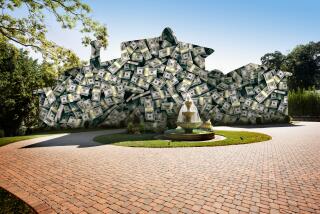Mystery enters the mix
- Share via
Tony Robbins, the motivational speaker, just sold a house in La Jolla, but the public record doesn’t say whether he got his $10.75-million asking price.
Nor does it tell what Wayne Inouye the president of the computer company Gateway Inc. paid for the property he bought in May in Irvine’s new private golf development, Shady Canyon. And that house in Laguna Beach that supposedly sold this summer for $20 million? Just try finding proof of that price.
Discretion, discretion, discretion has always been the second-most-popular real estate mantra, but professionals say high-end sales in recent years have become downright classified.
Confidentiality agreements -- practically unheard of a decade ago in single-family home sales -- have become common in the over-$10-million market, as have blind trusts and other legal mechanisms that camouflage identities and spending habits.
Meanwhile, thanks to a previously little-used provision in state law, officials say, sales prices and the taxes from which they can be extrapolated are being increasingly shielded from view within the public record.
In Orange County, one of the few jurisdictions in which record keeping has been modernized long enough to allow year-to-year comparisons, nearly 1,100 homes were sold this year with the price and tax information listed on the grant deeds filed with the clerk-recorder as “not to be disclosed.” The classification means, generally, that the information, while filed with the grant deed, will not be photographed as part of the microfiche record kept for the public. Such requests, officials say, have increased fivefold in the past four years.
Even trade groups that have long quietly shared sensitive information report an increase in secrecy. Annie Ives, chief executive officer of the Combined Los Angeles/Westside Multiple Listing Service, said the MLS logged 267 sales last year with undisclosed sales prices just in Greater L.A. between the coast and downtown.
That’s up more than 40% from 1999, she said, and a record that is already on its way to being broken, since nearly 240 “confidential sales disclaimers,” as they are termed, have been filed this year.
The vast majority of home sales are still an open book to the public -- address, ownership, sales price, assessed value and other information are recorded by the appropriate county and made available to any citizen. But for certain homeowners, professionals say, privacy appears to have become increasingly important.
“These options have been around for decades -- anyone can ask for confidentiality,” said Dero Forslund, president of the County Recorders Assn. of California. “But it tends to be associated with high-end properties.”
“Entertainers, in particular, want confidentiality -- and you can’t blame them from wanting to keep away the stalkers -- but I think we’re just living in a more secretive society,” said Vickie L. Gill, Southern California chapter president of the Appraisal Institute and a specialist in appraising multimillion-dollar homes.
Foreign-born buyers, for example, are often guarded by custom about sharing financial information, she said. Other real estate professionals also blamed “flippers” who are exploiting the hot market by buying moderately priced homes, making cosmetic fixes and reselling at steep markups that they’d rather buyers not know about.
The upshot, however, is a budding shortage of high-end “comps” or comparable sales prices -- along with potentially higher loan prices in the long term as lenders find it harder to confirm high-end valuations, they said.
“It’s gotten harder and harder for me to do my job,” Gill said. “Anywhere you have these trophy properties -- here, the Hamptons, Florida, wherever -- the owners want to keep everything as secret as possible. It makes it really difficult appraising them, because what are you going to base the value on?”
The situation has, on occasion, forced Gill to become a sort of real estate detective, lurking outside fancy gates in the hopes that an owner will show up and tell her the property’s sales price. At other times, she’s a beggar, offering to sign confidentiality agreements within confidentiality agreements if an owner will help her document a comp.
And some appraisers say they’ve taken matters into their own hands, for the good of the public. David G. Fish, a veteran appraiser based in upscale Corona del Mar, said he won’t appraise a home if he knows the buyer plans not to disclose the sales price.
“If they don’t want to help us do our job,” he said, “then we shouldn’t do business with them.”
More to Read
Inside the business of entertainment
The Wide Shot brings you news, analysis and insights on everything from streaming wars to production — and what it all means for the future.
You may occasionally receive promotional content from the Los Angeles Times.










